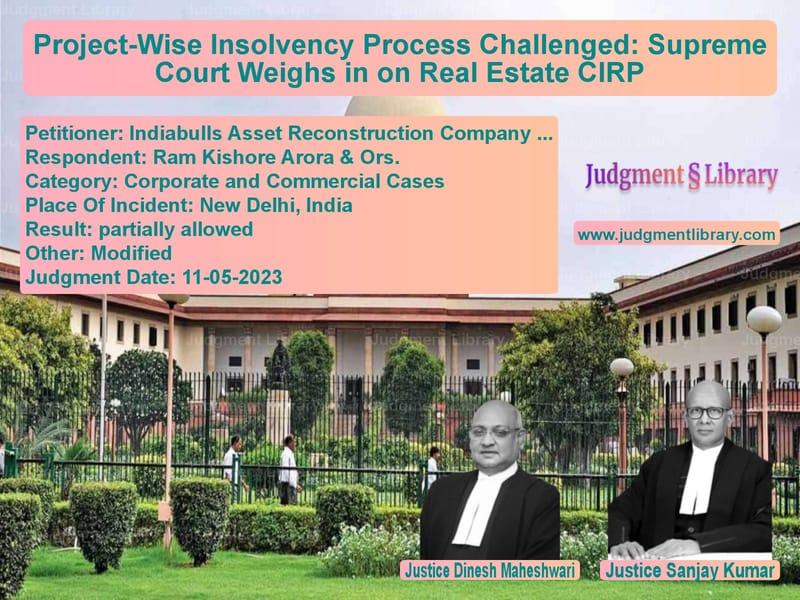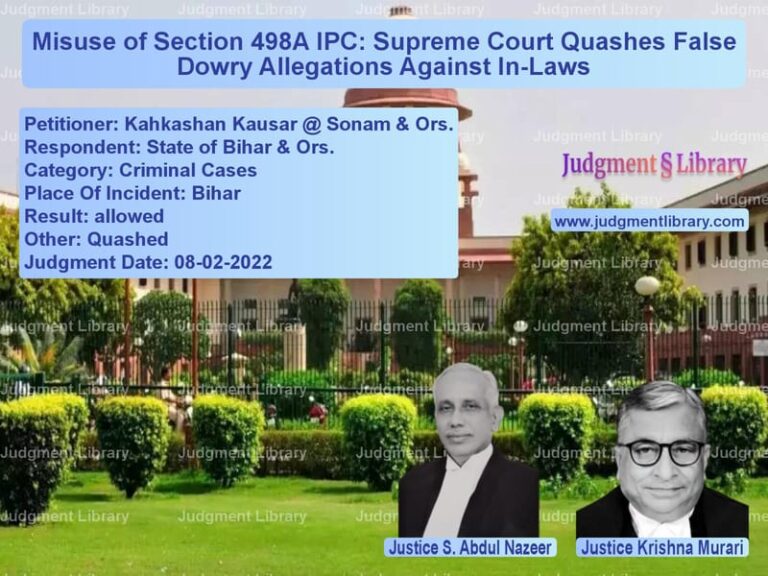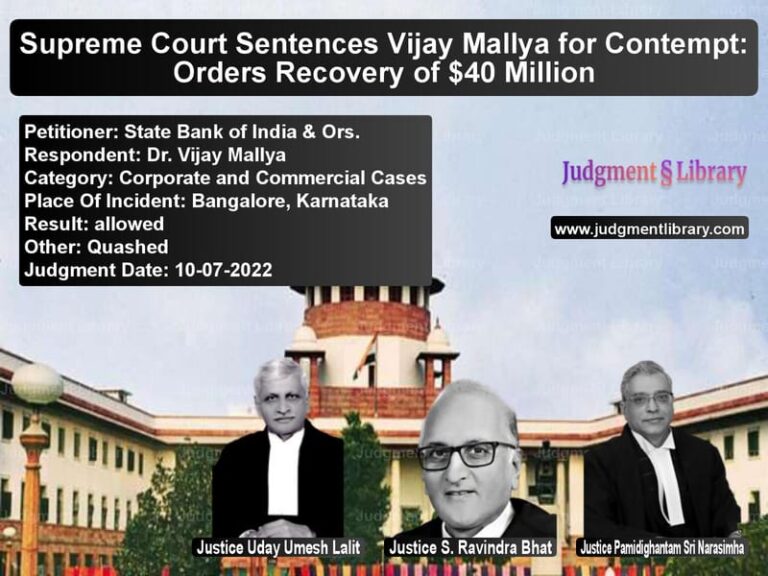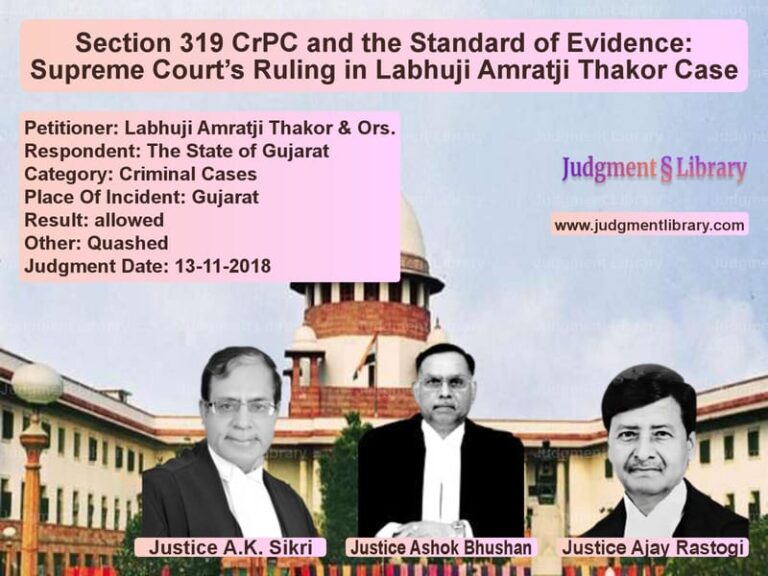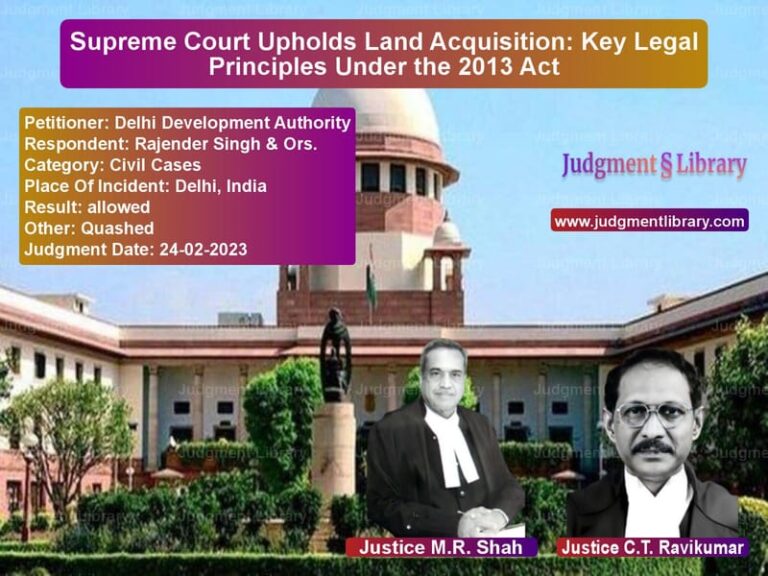Project-Wise Insolvency Process Challenged: Supreme Court Weighs in on Real Estate CIRP
The case of Indiabulls Asset Reconstruction Company Limited vs. Ram Kishore Arora & Ors. involves a significant legal dispute regarding the Corporate Insolvency Resolution Process (CIRP) under the Insolvency and Bankruptcy Code, 2016 (IBC). The Supreme Court was required to determine whether the National Company Law Appellate Tribunal (NCLAT) had the authority to direct a project-wise resolution process rather than applying CIRP to the corporate debtor as a whole.
The ruling has major implications for real estate companies facing insolvency, particularly those managing multiple projects, as it challenges whether resolution should occur at the entity level or be restricted to specific projects.
Background of the Case
The corporate debtor, Supertech Ltd., is a real estate developer engaged in multiple projects. Due to financial difficulties, the company defaulted on loans, leading financial creditors such as Union Bank of India and Indiabulls Asset Reconstruction Company Ltd. to initiate insolvency proceedings.
On March 25, 2022, the National Company Law Tribunal (NCLT) admitted an application under Section 7 of the IBC and initiated CIRP against Supertech Ltd. Subsequently, NCLT appointed an Interim Resolution Professional (IRP) to manage the process.
However, in an appeal filed by Supertech’s promoter, the NCLAT issued an interim order on June 10, 2022, directing that the insolvency resolution should be limited to only one project, Eco Village-II, instead of applying to the entire corporate entity.
The NCLAT order included the following key directions:
- CoC (Committee of Creditors) to be constituted for Eco Village-II only.
- Construction of other projects to continue under IRP supervision with assistance from the ex-management.
- Funds for other projects to be treated as interim finance, monitored by the IRP.
- Receivables from Eco Village-II to be maintained in a separate account.
- The resolution plan for Eco Village-II not to be voted upon without NCLAT approval.
Financial creditors, including Indiabulls Asset Reconstruction Company Ltd., challenged this project-specific approach, arguing that CIRP must be conducted for the corporate debtor as a whole, rather than on a project-by-project basis.
Petitioner’s Arguments
The appellants, including Indiabulls Asset Reconstruction Company Ltd. and Union Bank of India, contended:
- The IBC does not provide for a project-wise insolvency resolution. CIRP must apply to the entire corporate debtor.
- Restricting CIRP to one project prevents creditors with exposure to other projects from participating in the resolution process.
- The NCLAT order improperly allowed the ex-management of Supertech to continue controlling other projects, which is contrary to the objectives of IBC.
- The resolution plan must be reviewed by a properly constituted CoC, not limited to one project.
Respondent’s Arguments
The respondents, including the promoters and homebuyers, countered:
- A project-wise approach ensures the completion of ongoing real estate developments, benefiting homebuyers.
- Applying CIRP to all projects could delay resolution and further harm creditors and homebuyers.
- Allowing the ex-management to assist the IRP in completing projects prevents disruption and preserves asset value.
- Infusing funds into ongoing projects as interim finance is in the best interest of stakeholders.
Supreme Court’s Observations
The Supreme Court examined whether the NCLAT had the authority to adopt a project-wise resolution process instead of treating Supertech Ltd. as a single corporate debtor. Key observations included:
- The IBC does not explicitly allow project-wise insolvency resolution. Resolution should ideally apply to the entire corporate debtor.
- Restricting CIRP to one project while allowing other projects to continue under the ex-management raises concerns about fairness and creditor rights.
- Allowing a selective CoC for only Eco Village-II creates an imbalance in creditor participation.
- The Court must weigh the risk of injustice—whether maintaining project-wise resolution would harm other creditors and whether an entity-wide CIRP would disrupt real estate projects.
Key Judgment Excerpt
The Supreme Court observed:
“The Appellate Tribunal does not have power under IBC to allow project-wise CIRP and does not have power to accept a resolution plan presented by the promoter without giving opportunity to the CoC to study the commercial viability of the plan.”
The Court further ruled:
“If at the present stage, on the submissions of the appellants, CoC is ordered to be constituted for the corporate debtor as a whole in displacement of the directions of the Appellate Tribunal, it is likely to affect those ongoing projects and thereby cause immense hardship to the homebuyers while throwing every project into a state of uncertainty.”
Final Verdict
The Supreme Court modified the NCLAT’s interim order and issued the following directions:
- The project-wise resolution process will continue only for Eco Village-II, but the voting on the resolution plan will require Supreme Court approval.
- All other projects of Supertech Ltd. will remain ongoing under IRP supervision, but no additional rights will be given to the ex-management.
- The question of whether project-wise CIRP is permissible under IBC will be decided in the final hearing.
- The NCLAT will proceed with evaluating resolution proposals but must await Supreme Court orders before finalizing any resolution plan.
The Supreme Court’s ruling is crucial in determining whether real estate insolvencies should follow a project-specific or entity-wide approach, impacting homebuyers, creditors, and developers alike.
Petitioner Name: Indiabulls Asset Reconstruction Company Limited.Respondent Name: Ram Kishore Arora & Ors..Judgment By: Justice Dinesh Maheshwari, Justice Sanjay Kumar.Place Of Incident: New Delhi, India.Judgment Date: 11-05-2023.
Don’t miss out on the full details! Download the complete judgment in PDF format below and gain valuable insights instantly!
Download Judgment: indiabulls-asset-rec-vs-ram-kishore-arora-&-supreme-court-of-india-judgment-dated-11-05-2023.pdf
Directly Download Judgment: Directly download this Judgment
See all petitions in Bankruptcy and Insolvency
See all petitions in Company Law
See all petitions in Corporate Compliance
See all petitions in Judgment by Dinesh Maheshwari
See all petitions in Judgment by Sanjay Kumar
See all petitions in partially allowed
See all petitions in Modified
See all petitions in supreme court of India judgments May 2023
See all petitions in 2023 judgments
See all posts in Corporate and Commercial Cases Category
See all allowed petitions in Corporate and Commercial Cases Category
See all Dismissed petitions in Corporate and Commercial Cases Category
See all partially allowed petitions in Corporate and Commercial Cases Category

